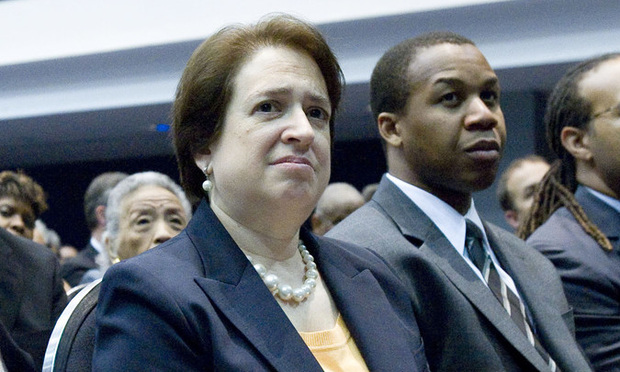Kagan Sounds New Alarm as Supreme Court Scraps Another Precedent
“Under cover of overruling 'only' a single decision, today's opinion smashes a hundred-plus years of legal rulings to smithereens," Kagan wrote in her dissent. Chief Justice Roberts accused the dissent of making "extreme assertions."
June 21, 2019 at 11:53 AM
5 minute read
 U.S. Supreme Court Justice Elena Kagan. Credit: Diego M. Radzinschi / NLJ
U.S. Supreme Court Justice Elena Kagan. Credit: Diego M. Radzinschi / NLJ
Ruling in an important takings case, the U.S. Supreme Court on Friday overturned a long-standing precedent and said plaintiffs can go directly to federal court to vindicate their Fifth Amendment right to “just compensation” when the government takes their property.
The 5-4 decision in Knick v. Township of Scott represents the second time the court this term has overturned a significant precedent, and Justice Elena Kagan, who authored a dissent in the case, said the majority's decision “transgresses all usual principles of stare decisis,” the principle of standing by precedents.
Kagan added, “Under cover of overruling 'only' a single decision, today's opinion smashes a hundred-plus years of legal rulings to smithereens.” She also wrote, “Its consequence is to channel a mass of quintessentially local cases involving complex state-law issues into federal courts.”
Kagan also wrote, “The majority's overruling of Williamson County will have two damaging consequences. It will inevitably turn even well-meaning government officials into lawbreakers. And it will subvert important principles of judicial federalism.”
Liberal justices Ruth Bader Ginsburg, Stephen Breyer and Sonia Sotomayor joined Kagan's 19-page dissent. The case was first argued in early October, before Justice Brett Kavanaugh joined the court, but was reargued in January, likely to overcome a 4-4 tie. Kavanaugh sided with the majority.
The decision overruled Williamson County Regional Planning Commission v. Hamilton Bank, a 1985 decision that found that a takings claim is not “ripe” for federal court if the property owner has not exhausted compensation remedies in state courts.
Chief Justice John Roberts Jr., writing for the majority, said that rule has been proven inefficient and has the effect of foreclosing litigation in federal court altogether.
Roberts wrote, “A property owner has an actionable Fifth Amendment takings claim when the government takes his property without paying for it,” and should be able to file a civil rights Section 1983 claim in federal court at that time.
Responding to Kagan's dissent, Roberts wrote, “The dissent cannot, with respect, fairly maintain its extreme assertions regarding our application of the principle of stare decisis.”
“Williamson County was not just wrong. Its reasoning was exceptionally ill founded and conflicted with much of … our takings jurisprudence,” Roberts added.
 Chief Justice John Roberts. Photo: Tim Roske
Chief Justice John Roberts. Photo: Tim RoskeRoberts said the Williamson County “decision has come in for repeated criticism over the years from Justices of this Court and many respected commentators.” He pointed to rulings written by, among others, the late Chief Justice William Rehnquist and Justice Clarence Thomas.
“Governments need not fear that our holding will lead federal courts to invalidate their regulations as unconstitutional. As long as just compensation remedies are available—as they have been for nearly 150 years—injunctive relief will be foreclosed,” Roberts wrote.
Rose May Knick's home in Lackawanna County, Pennsylvania, allegedly was situated on an ancestral burial ground and was deemed public property by the local municipality. She brought the case to the Supreme Court, claiming that a Scott Township ordinance requiring owners of private property with cemeteries on-site to open their grounds to the public violates the Constitution by taking private property without compensation, violating the Fifth Amendment.
Pacific Legal Foundation lawyer David Breemer, who represented Knick, said Friday, “This decision is a very long time coming for Rose and other property owners who have had federal courtroom doors slammed shut in their faces whenever they seek compensation for a governmental taking of their private property. The court's decision sends a message that constitutionally-based property rights deserve federal protection just like other rights.”
In the first decision overruling a precedent in Franchise Tax Board of California v. Hyatt last month, Justice Stephen Breyer stated, “Today's decision can only cause one to wonder which cases the Court will overrule next.”
Kagan, in her dissent Friday, cited Breyer's comment and said, “Well, that didn't take long. Now one may wonder yet again.”
The court's ruling in Knick v. Township of Scott posted below:
Read more:
Staring Down 'Stare Decisis': How to Ask SCOTUS to Overturn Precedent
Breyer Denounces Ruling That Strikes Precedent, Questions Which Cases Are Next
The Justices Had 5 Votes to Overturn 'Roe' in 1992. Why That Didn't Happen.
This content has been archived. It is available through our partners, LexisNexis® and Bloomberg Law.
To view this content, please continue to their sites.
Not a Lexis Subscriber?
Subscribe Now
Not a Bloomberg Law Subscriber?
Subscribe Now
NOT FOR REPRINT
© 2025 ALM Global, LLC, All Rights Reserved. Request academic re-use from www.copyright.com. All other uses, submit a request to [email protected]. For more information visit Asset & Logo Licensing.
You Might Like
View All

'A Warning Shot to Board Rooms': DOJ Decision to Fight $14B Tech Merger May Be Bad Omen for Industry

'Incredibly Complicated'? Antitrust Litigators Identify Pros and Cons of Proposed One Agency Act
5 minute readTrending Stories
- 1Crypto Hacker’s $65 Million Scam Ends in Indictment
- 2Trump's Inspectors General Purge Could Make Policy Changes Easier, Observers Say
- 3Supporting Our Supreme Court Justices in the Guardianship Part
- 4'Erroneous Rulings'?: Wilmer Asks 4th Circuit to Overturn Mosby's Criminal Convictions
- 5Judge Orders Acquittal of Ex-Prosecutor on 1 of 2 Counts in Misconduct Trial Over Ahmaud Arbery Case
Who Got The Work
J. Brugh Lower of Gibbons has entered an appearance for industrial equipment supplier Devco Corporation in a pending trademark infringement lawsuit. The suit, accusing the defendant of selling knock-off Graco products, was filed Dec. 18 in New Jersey District Court by Rivkin Radler on behalf of Graco Inc. and Graco Minnesota. The case, assigned to U.S. District Judge Zahid N. Quraishi, is 3:24-cv-11294, Graco Inc. et al v. Devco Corporation.
Who Got The Work
Rebecca Maller-Stein and Kent A. Yalowitz of Arnold & Porter Kaye Scholer have entered their appearances for Hanaco Venture Capital and its executives, Lior Prosor and David Frankel, in a pending securities lawsuit. The action, filed on Dec. 24 in New York Southern District Court by Zell, Aron & Co. on behalf of Goldeneye Advisors, accuses the defendants of negligently and fraudulently managing the plaintiff's $1 million investment. The case, assigned to U.S. District Judge Vernon S. Broderick, is 1:24-cv-09918, Goldeneye Advisors, LLC v. Hanaco Venture Capital, Ltd. et al.
Who Got The Work
Attorneys from A&O Shearman has stepped in as defense counsel for Toronto-Dominion Bank and other defendants in a pending securities class action. The suit, filed Dec. 11 in New York Southern District Court by Bleichmar Fonti & Auld, accuses the defendants of concealing the bank's 'pervasive' deficiencies in regards to its compliance with the Bank Secrecy Act and the quality of its anti-money laundering controls. The case, assigned to U.S. District Judge Arun Subramanian, is 1:24-cv-09445, Gonzalez v. The Toronto-Dominion Bank et al.
Who Got The Work
Crown Castle International, a Pennsylvania company providing shared communications infrastructure, has turned to Luke D. Wolf of Gordon Rees Scully Mansukhani to fend off a pending breach-of-contract lawsuit. The court action, filed Nov. 25 in Michigan Eastern District Court by Hooper Hathaway PC on behalf of The Town Residences LLC, accuses Crown Castle of failing to transfer approximately $30,000 in utility payments from T-Mobile in breach of a roof-top lease and assignment agreement. The case, assigned to U.S. District Judge Susan K. Declercq, is 2:24-cv-13131, The Town Residences LLC v. T-Mobile US, Inc. et al.
Who Got The Work
Wilfred P. Coronato and Daniel M. Schwartz of McCarter & English have stepped in as defense counsel to Electrolux Home Products Inc. in a pending product liability lawsuit. The court action, filed Nov. 26 in New York Eastern District Court by Poulos Lopiccolo PC and Nagel Rice LLP on behalf of David Stern, alleges that the defendant's refrigerators’ drawers and shelving repeatedly break and fall apart within months after purchase. The case, assigned to U.S. District Judge Joan M. Azrack, is 2:24-cv-08204, Stern v. Electrolux Home Products, Inc.
Featured Firms
Law Offices of Gary Martin Hays & Associates, P.C.
(470) 294-1674
Law Offices of Mark E. Salomone
(857) 444-6468
Smith & Hassler
(713) 739-1250









